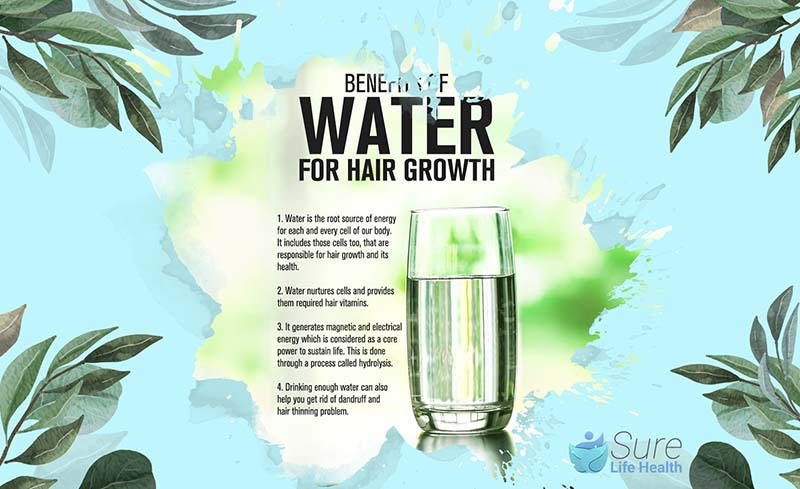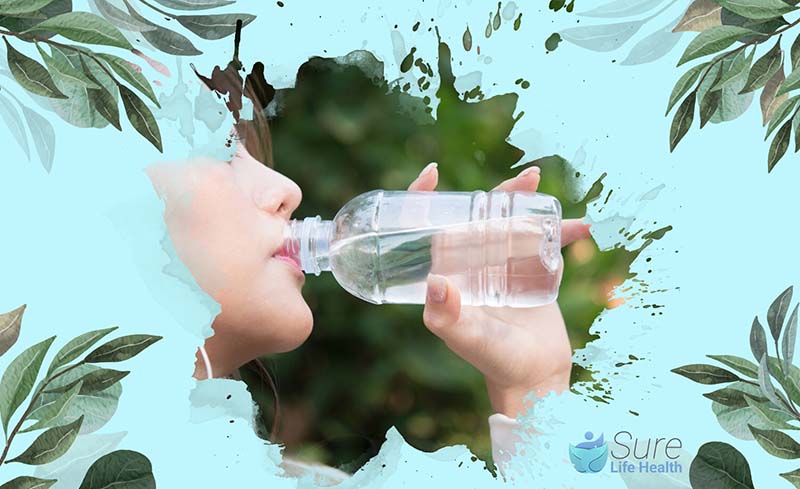Water is the essence of life, making up about 80% of the human body and playing a crucial role in every bodily function. From the depths of our cells to the tips of our hair, maintaining adequate hydration is key to our overall health and vitality. Proper water intake is not only essential for survival but also critical for promoting healthy hair growth.
The amount of water each person needs can vary widely, influenced by factors like body composition, activity levels, and general health. Health experts typically recommend that men aim to drink at least 15.5 cups of water per day, while women should consume around 11.5 cups.
Failing to meet these hydration needs can lead to a multitude of health problems, including reduced hair health and increased hair loss. This introduction explores the pivotal role of water in sustaining our wellbeing and nurturing lush, healthy hair.
Does Water Help Hair Growth?
Drinking enough water is essential for the body to perform its necessary functions effectively. Staying hydrated ensures that every system in the body, including those responsible for hair health, operates optimally.
When your body is well-hydrated, it’s better equipped to deliver nutrients to hair follicles, maintain hormone balance, and support the hair growth cycle. This means that your hair is more likely to grow strong and healthy, rather than becoming dry, brittle, and prone to breakage.
Adequate water intake helps to prevent these issues by ensuring that your hair remains hydrated from the inside out. Thus, by maintaining good hydration levels, you not only support your overall health but also promote the vitality and growth of your hair.

The Significance of Water for Your Hair
Maintaining proper hydration is essential for optimal function of our cells, tissues, and muscles. The amount of water each person needs can vary widely depending on several factors like age, sex, how active they are, and how much they sweat. Therefore, the common advice to drink “eight cups of water a day” might not be enough for everyone.
Staying well-hydrated helps keep our energy levels high, supports good digestion, improves focus, and should ideally result in light-colored or nearly clear urine. Unlike proper hydration, dehydration can be easier to notice because we often don’t feel thirsty until we are already dehydrated.

How Water Helps Hair Grow
- Water Stimulates Hair Growth: Proper hydration maintains scalp moisture levels, promoting the growth of new strands. It’s essential to ensure both internal and external hydration to prevent dryness, dandruff, and other skin irritations associated with water deficiency.
- Water Strengthens Your Hair: Adequate hydration reduces the risk of split ends and brittle texture, thereby minimizing damage and breakage. Water plays a pivotal role in enhancing vitamin absorption, vital for hair growth, and regulates the circulatory system, optimizing nutrient delivery to follicles. Moreover, water activation of nerve endings and neural sensors at hair roots enhances natural hair vitality.
- Water Flushes Pollutants and Toxins From Your Hair: Hydration facilitates hair cleansing by removing dirt, debris, and sediment externally, while internally promoting detoxification through organs like the liver, kidneys, and skin. Using a water filter ensures the use of clean water during hair washing, enhancing overall hair health.
Note: In addition to hydration, maintaining a balanced diet rich in vitamins, minerals, and antioxidants supports optimal hair growth and health. Regular scalp massages can also improve circulation and nutrient delivery to hair follicles, further enhancing growth and vitality.

How Drinking Water Boosts Hair Growth
Drinking enough water is key for keeping your scalp and hair healthy. Staying hydrated helps your scalp’s cells use essential vitamins and minerals more effectively, which in turn stimulates your hair follicles.
Proper hydration prevents scalp issues such as dandruff, itchiness, and dryness, while also minimizing the risk of hair thinning and loss. Additionally, water helps maintain the moisture balance in the hair, preventing dryness that can lead to split ends and breakage.
Furthermore, staying hydrated enhances the energy transmission from the scalp to the hair follicles, promoting healthier and more resilient hair growth. It also helps flush out toxins from the body, which can affect overall health and the condition of your hair follicles.
Lastly, water contributes to the thickness and fullness of hair, while also supporting better blood circulation and nutrient delivery to the scalp. To boost hydration, include water-rich fruits and vegetables in your diet along with hydrating beverages like coconut water and fruit juices, which also provide vital nutrients for hair health.
How Do You Know If Your Hair Is Dehydrated?
Detecting dehydrated hair early is important for keeping it healthy and vibrant. One clear indicator is the presence of split ends, not just at the tips but also near the middle or ends of the strands. Also, if your scalp feels dry, flaky, or itches frequently, it could mean that your hair shaft is missing its essential protective outer layer due to not enough hydration.
Changes in your hair’s texture can also point to dehydration, such as feeling rougher or looking frizzy even with regular use of hair products. Dehydrated hair may tangle more easily, which can make styling more challenging. Additionally, pay attention to the elasticity of your hair; if you have trouble getting your hair to curl or if styles don’t hold their shape, these could be signs of a lack of moisture.
Notes:
- Hydrate from the inside out: Ensure you’re consuming enough water and eating a balanced diet rich in vitamins and minerals essential for hair health.
- Choose hydrating hair products: Opt for shampoos and conditioners formulated to provide deep hydration and moisture retention.
- Limit heat styling: Excessive heat can strip moisture from your hair, contributing to dehydration and damage. Use heat styling tools sparingly and always apply a heat protectant product beforehand.

Recommended Daily Water Intake for Hair Growth
Ensuring adequate hydration is not only essential for overall health but also plays a significant role in promoting hair growth. While the general recommendation of 8-12 cups (or three liters) of water daily is widely known, individual water needs can vary based on various factors.
According to the University of Missouri System, a more personalized approach suggests drinking ounces of water equivalent to half your body weight, with an additional 12 ounces for every 30 minutes of planned exercise. However, it’s crucial to consider individual circumstances such as pregnancies or specific health conditions that may influence hydration requirements.
Environmental factors also impact your body’s water needs. For instance, sweating during hot summer days increases hydration demands, while dry winter air may necessitate greater water intake to maintain optimal functioning of your nose, throat, and sinuses.
Notes:
- Monitor urine color: Aim for pale yellow urine, which indicates proper hydration.
- Incorporate hydrating foods: Fruits and vegetables with high water content, such as watermelon and cucumber, can contribute to your daily fluid intake.
- Set reminders: Use smartphone apps or schedule reminders to ensure you’re drinking water consistently throughout the day.
Conclusion
In conclusion, the link between water and hair growth is clear. By prioritizing hydration and ensuring you drink enough water, you can nourish your follicles and promote healthy hair growth from within. This blog aims to highlight how crucial hydration is for maintaining vibrant and resilient hair.
Does water help hair growth? Absolutely, and we hope this information inspires you to keep hydrated. Share your hydration experiences and hair growth success stories with us – we’d love to hear from you!
For more insightful tips on health and wellness, don’t forget to check out our other posts on Sure Life Health. Stay hydrated, stay healthy, and let your hair thrive!
Professor Gaye Cunnane, PhD, MB, FRCPI
As the Director of Health and Wellbeing at RCPI, Professor Gaye Cunnane is at the helm of initiatives aimed at enhancing the health and well-being of RCPI Trainers and Trainees. Her role extends beyond administration; she is also a respected clinical professor of rheumatology and a consultant rheumatologist at Trinity College Dublin (TCD) and St James’s Hospital. Prof. Cunnane’s medical journey began at TCD, where she graduated from medical school, and her path has been marked by both clinical and academic excellence.
After completing her basic clinical training in medicine, she embarked on PhD studies at University College Dublin and St Vincent’s University Hospital. Her research during this period was focused on prognostic markers in early inflammatory arthritis, a project that saw her collaborating with esteemed universities across Europe, including in Switzerland, The Netherlands, the UK, and Sweden.
Prof. Cunnane’s career took her to the University of California, San Francisco, where she spent three years delving into research on new treatments for lupus. Her academic prowess led her to the University of Leeds in 2001 as a senior lecturer, before returning to Ireland in 2003 to assume her current roles. She has also served as the National Specialty Director for Rheumatology training in Ireland, Programme Director for Basic Specialist Training with RCPI, and as a past President of the Irish Society for Rheumatology.
PUBLISHED ARTICLES
“Rheumatic disease differentiation using immunoglobulin G sugar printing by high-density electrophoresis”: Published in The Journal of Rheumatology, this study reflects her in-depth investigation into rheumatic diseases.
“Benefits of exercise in patients with rheumatoid arthritis: a randomized controlled trial”: This research work, highlighting the positive impact of exercise on rheumatoid arthritis, underscores Prof. Cunnane’s dedication to practical, patient-centered research.
Additionally, Prof. Cunnane has made notable contributions to the Annals of the Rheumatic Diseases, discussing early referral, diagnosis, and treatment of rheumatoid arthritis. She has also been involved in a study on the NCBI platform investigating exercise benefits in rheumatoid arthritis patients.
Professor Gaye Cunnane’s career is a testament to her commitment to improving patient outcomes in rheumatology through rigorous research, clinical excellence, and dedicated teaching. Her work continues to influence the field of rheumatology, both in Ireland and internationally.

